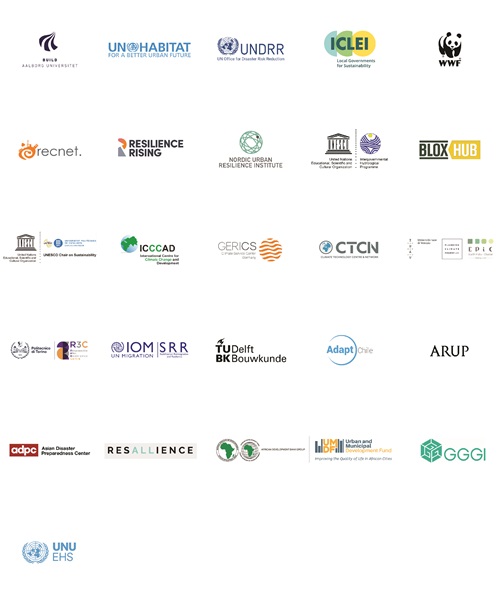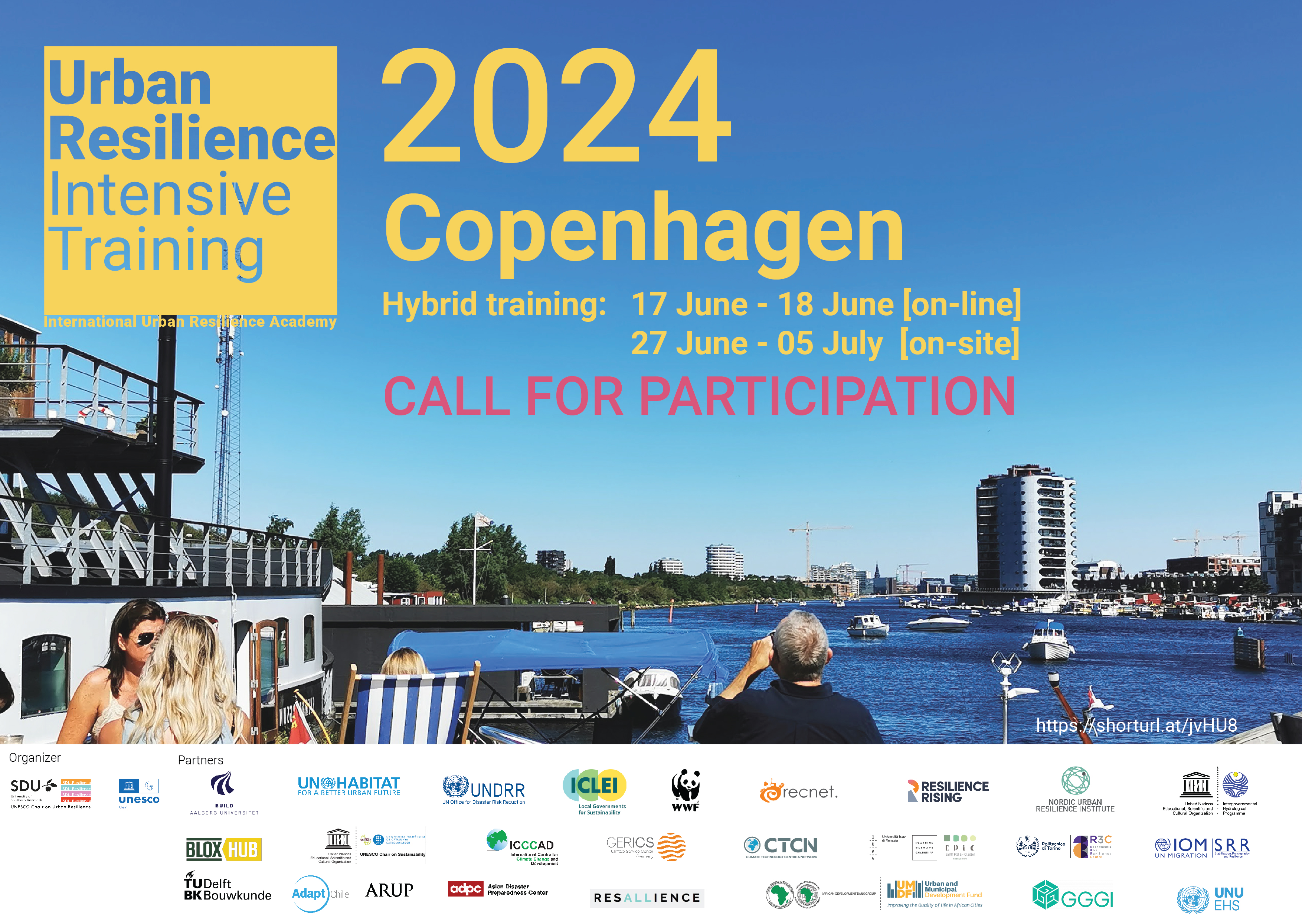17 – 18 June (online)
27 June – 5 July (in person)
Call for Participation!
The Urban Resilience Intensive Training (URIT) 2024 brings together policymakers, practitioners and researchers for online session between 17 – 18 June and to Copenhagen between 27 June and 5 July 2024. URIT aims to expand the participants' knowledge on policies, tools, strategic and action planning for resilient urban transition, integrating climate mitigation and adaptation, for a just and green transition.URIT brings together transdisciplinary knowledge and perspectives on urban resilience from science, policy, and practice. URIT aims to build skills and competencies to tackle global challenges in the Global South and North. Through a system thinking approach, the program focuses specifically on core topics such as climate change and resilience analysis, future scenarios, strategic and action planning; as well as cross-cutting topics such as ecosystem services, multi-level governance, nature-based solutions, disaster risk reduction and participation. The highly interactive programme includes keynotes from international speakers, peer-to-peer sessions among participants, field visits to best practices in Copenhagen and group work on specific cities worldwide.
Download the call for participation here
See the 2023 edition of the training here , and report results of 2023 edition here
Urban Resilience Intensive Training 2024
Cities and their populations are vulnerable and increasingly exposed to rapid and slow on-setting climate and environmental disasters, which frequency and intensity are growing exponentially. Yet, cities are also major centres of economic activity, social life and culture, innovation and knowledge-creation.
Urban resilience aims to increase the ability of urban systems to respond systemically and dynamically to present and future shocks and stresses related to major global challenges as: unsustainable development patterns, rapid and unplanned urbanization, climate change mitigation and adaptation.
Urban resilience is instrumental in addressing both causes and effects of these major global challenges, re-thinking how cities are designed, planned and managed, and fostering innovation. The scientific research on urban resilience has been exponentially growing in the last decade, parallelly a growing number of cities worldwide started developing resilience-related plans and actions, following the recommendations and prescriptions national and international policies, as: Sustainable Development Goals, Paris Agreement, New Urban Agenda and Sendai Framework for Disaster Risk Reduction.
The key challenge for urban resilience is to co-develop and harmonize scientific and practice-led knowledge to support informed and science-based decision and policymaking, to enable our cities to evolve and innovate.
Cities, both in the Global South and North, will need to re-think how they are designed, planned, managed, and lived. However, many lessons can already be distilled and can be used to strengthen the adaptive capacities of cities to face multiple and even concurrent global crises.
The training adopts a process design methodology, through which the participants will learn about system and stakeholder analysis methods, future scenarios (forecasting, visioning and backcasting), and strategic and action planning.
The training is funded on problem-based learning. The participants, divided into small groups, will respond to a specific challenge, applying specific tools and methods through a system thinking approach.
This year's challenge is focusing on just and green transition in the frame of climate change and how to enhance urban resilience through transformative strategies and actions.The training will also focus on key cross-sectoral issues, such as multi-level governance, nature-based solutions, finance, appropriate technology, participatory processes and stakeholders' involvement, generation of co-benefits, urban metabolism, and circular economy.
The highly interactive programme includes keynotes from international speakers, peer-to-peer sessions among participants, field visits to best practices in Copenhagen and group work on specific cities worldwide.
- The basis of urban resilience and global challenges science, and research development in different disciplinary contexts.
- International policies (Sustainable Development Goals, Paris Agreement, New Urban Agenda and Sendai Framework for Disaster Risk Reduction).
- Urban resilience practices with specific case studies from cities worldwide, including strategic plans, action plans, and technological solutions.
- Cross-sectorial and thematic issues.
- System mapping & stakeholders’ analysis,
- Analysing current and future urban trends and drivers, at local and global level,
- Future scenarios methods: visioning and backcasting,
- Strategic and action planning.
Practitioners from the private and public sectors, including also non-profit organizations.
Policymakers from national and subnational governments and from international and intergovernmental organizations.
Scientists and Researchers from universities and research organizations, including PhD candidates, researchers and lecturers.
Before starting the Urban Resilience Intensive Training, two days of online sessions of 3 hours (each day) will be organized to familiarize participants with the core fundamentals of urban resilience fundamentals, group formation and selection and discussion on case studies challenges that participants will be addressing during the training. of case studies. Then, the seven days of intensive training are mainly organised with lectures, group work and field visits in Copenhagen. Upon the conclusion of the training, the participants will receive a Certificate of Participation, for which it is required to attend 80 % of the daily sessions, contribute to the group work and submit the required outputs.
The entire training, including lectures, group work and self-learning, is approximately 146 hours, equivalent to 5 ECTS.
Course date: 17 – 18 June (online) and 27 June – 5th July (in person)
Speakers:
- Cristóbal Reveco Umaña, Scientist, Climate Service Center (GERICS), Director / Founder, Adapt-Chile
- Esteban Leon, Head, City Resilience Global Programme (CRGP), United Nations Human Settlements Programme (UN-Habitat)
- Fruzsina Straus, Human Settlements Officer, Africa Focal Point for Urban Resilience, Climate Action and DRR, United Nations Human Settlements Programme (UN-Habitat)
- Jennifer Lenhart, Global Leard WWF Cities, World Wide Fund for Nature (WWF)
- Roberto Rocco, Associate Professor of Spatial Planning and Strategy, TU Delt - Technische Universiteit Delft (TU Delft) Department of Urbanism
- Pasquale Capizzi, Associate Director, ARUP
- Sara Candiracci, Associate Director, ARUP
- Sebastian Mernild, Professor in Climate Change (PhD & DSc), Head of SDU Climate Cluster, University of Southern Denmark (SDU)
- Sanjaya Bhatia, Head, United Nations Disaster Risk Reduction office for Northeast Asia and Global Education and Training Institute (GETI)
- Simone Sandholz, Academic Officer, Head of Urban Futures and Sustainability Transformation (FAST) Programme, United Nations University – Institute for Environment and Human Security (UNU – EHS)
- Dražen Kučan, Senior Investment Operations Specialist – Urban & Water Sectors Coordinator (Region 2), Asian Infrastructure Investment Bank (TBC)
- Jacob Rasmussen, Associate Professor, Roskilde University (RUC) (TBC)
- Maria Manez Costa, Scientist, Climate Service Center (GERICS) (TBC)
- Maryke van Staden, Director of Business Development, ICLEI - Local Governments for Sustainability (TBC)
Course programme 17 – 18 June 2024 (online).
Download the programme (on-line part).
Course programme 27 June – 5th July 2024 (in person).
Download the programme (in person part).
English language proficiency is required.
There is a limited number of places available. Inscription will be on first come first serve basis.
900 EUR (equivalent to 6,750 DKK) - Regular fee, no later than 7 June 23:59 CET.
600 EUR (equivalent to 4,500 DKK) - Early bird fee, no later than 1 May 23:59 CET, limited to 15 participants.
300 EUR (equivalent to 2,250 DKK) - Reduced fee for the participants from the Least Developed Countries*, no later than 7 June 23:59 CET, limited to 10 participants.
The registration fee includes:
- Participation in the course
- Site visits
- Coffee breaks
- Downloadable learning materials
- Participation diploma
- Welcome package
The registration fee does not include:
- Travel
- Subsistence (accommodation, meals, etc.)
- Visa expenses
* A Limited number of fee waivers are available for participants that are nationals of and currently working in one of the Least Developed Countries (LDC). Please refer to the United Nations' list of LDC countries. Upon registration, applicants must complete and sign an affidavit confirming the above-mentioned condition.
Registration is open until 7 June 23.59 CET.
Register in Conference Manager platform
Once the registration is done, participants are responsible for visa application in their country; in case of visa denial the training fee will not be refunded.
In terms of enquiries regarding course content, schedule, fee rate, etc. please contact IURA Organizing Committee at sup@iti.sdu.dk
Upon completion of the registration process,If you have citizenship outside of EU, you should contact Luna Kyung Keller Larsen, luna@sdu.dk from our International Staff Office at the University of Southern Denmark to determine, if you need a short visa to enter Denmark. Kindly contact Luna as soon as possible, as the visa process can take up to two months from the beginning of the process till you get the visa issued.You can contact Luna Kyung Keller Larsen at: luna@sdu.dk
For questions related to payment method and Conference Manager platform, please contact: Charlotte Kjær Bruun at cbp@iti.sdu.dk
Organisers

Partners





